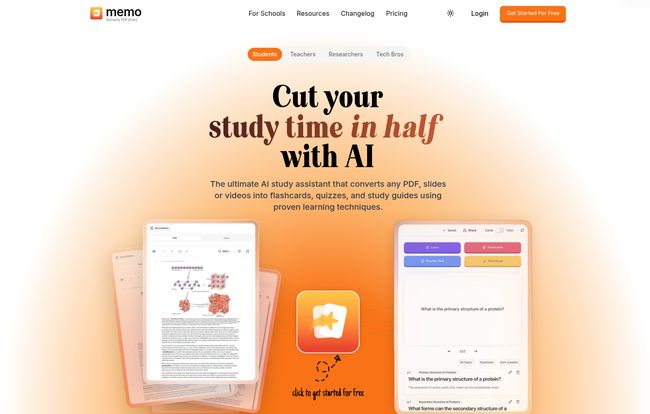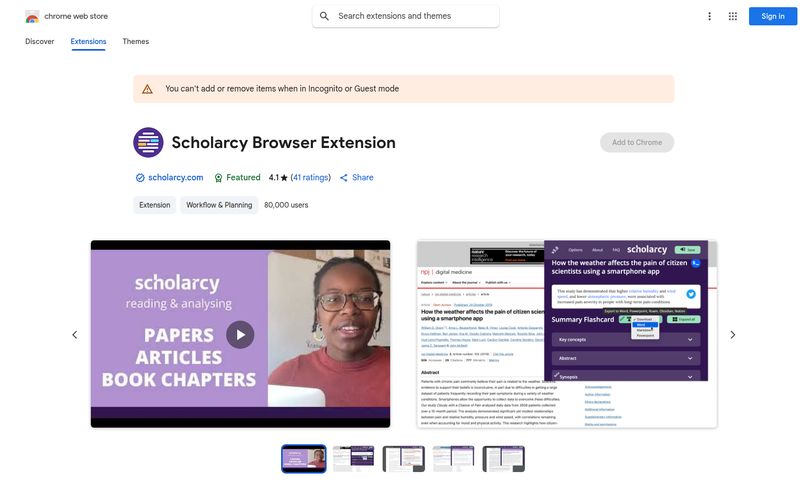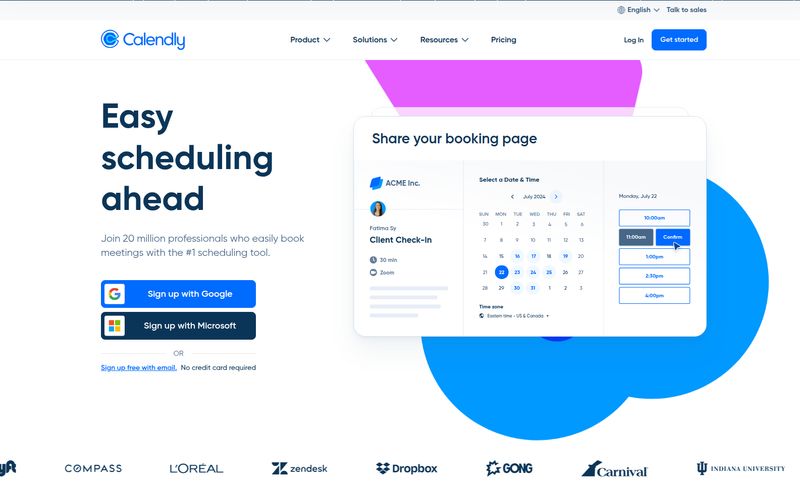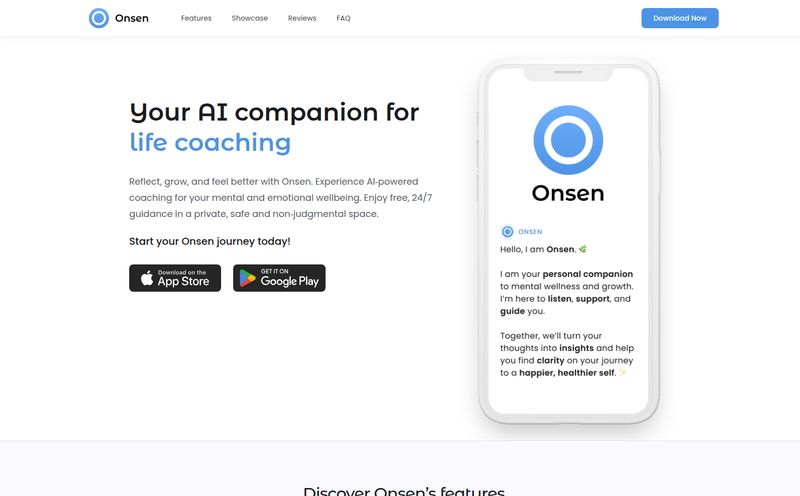I remember my college days. The late nights, the highlighter fumes, the mountain of textbooks that seemed to mock me from the corner of my desk. My primary study method? Laboriously handwriting hundreds of flashcards. It was a rite of passage, sure, but man was it a time-suck. My fingers would cramp, my brain would turn to mush, and I’d still feel like I was just scratching the surface.
Fast forward to today, and the game has completely changed. We're living in the age of AI, and it's creeping into every corner of our lives, including how we learn. And honestly? It’s about time. A whole new breed of tools is emerging, promising to make studying more efficient, effective, and maybe even… enjoyable? One of the names creating a lot of buzz in this space is Memo AI.
I've been in the digital marketing and SEO world for years, so I'm naturally skeptical but also incredibly curious about any tech that promises to streamline information processing. So, I decided to take Memo for a spin. Is it just another flashcard app with a fancy AI sticker, or is it something more?
What Exactly is Memo AI? (And Why Should You Care?)
Let's get one thing straight: Memo AI isn't just a place to type out your notes. Think of it less like a digital notebook and more like a personal teaching assistant. You feed it your raw materials—those chunky PDFs, your professor's lecture slides, rambling notes, even YouTube videos—and it digests them. Then, it spits out a suite of powerful, custom-made study tools. We're talking flashcards, multiple-choice quizzes, and even detailed mindmaps.
The whole pitch is “Study Smarter, Not Harder,” a phrase we’ve all heard a million times. But here, it actually feels tangible. It’s about automating the most tedious part of studying—creating the materials—so you can spend more time actually learning them. It’s like having a research assistant who's an expert at curriculum design and never needs a coffee break. It’s pretty slick.
The Science Behind the Magic: Active Recall and Spaced Repetition
Here's where my inner geek gets excited. Memo isn’t just throwing random questions at you. Its entire system is built on two powerhouse learning principles that cognitive scientists have been championing for decades: active recall and spaced repetition.
In simple terms, active recall is the process of actively retrieving information from your brain, rather than passively rereading it. Think of it as answering a question instead of just looking at the answer. It’s harder, sure, but it builds much stronger neural pathways. Spaced repetition is the method of reviewing that information at increasing intervals over time. You review a concept just as you’re about to forget it, which forces your brain to work a little harder to recall it, cementing it into your long-term memory. It's a proven method, and you can read heaps about the Ebbinghaus forgetting curve if you want to go down that rabbit hole.
What Memo does, and what makes it so potent, is that it automates this entire process. It generates the questions to force active recall and can help you schedule your study sessions based on spaced repetition principles. It takes the guesswork and the manual setup out of a scientifically-backed study strategy.
A Closer Look at the Killer Features
Okay, so the theory is solid. But what's it actually like to use? I uploaded a few dense articles on SEO algorithms to see what it could do. Here’s what stood out.
The AI Copilot and Professor: Your Personal Tutor
This is where things get a bit sci-fi. After you upload a document, you can essentially have a conversation with it. The AI Professor feature lets you ask questions in plain English. For example, I asked, “Explain the concept of ‘search intent’ like I’m five,” and it gave me a surprisingly clear and simple analogy. You can ask it to make connections between different sections, summarize a complex chapter, or create practice questions on a specific topic. It feels less like software and more like a patient, knowledgeable study buddy.
From Clunky PDF to Smart Flashcards in a Flash
This is the bread and butter. The platform scans your document and automatically generates flashcards and multiple-choice questions. And they’re not just basic term-definition pairs. The AI has contextual awareness, so it can create questions that test your understanding of concepts, not just your ability to memorize a word. The process is ridiculously fast. A 60-page PDF I uploaded was processed and ready with a full quiz in under two minutes.

Visit Memo AI
It also generates mindmaps, which are a godsend for visual learners. Seeing how all the concepts in a chapter connect to each other on a single screen can provide that “aha!” moment that a wall of text never will.
Playing Nice with Others: Anki & Quizlet Integration
For me, this is a massive green flag. A lot of new tools try to lock you into their ecosystem, which is always frustrating. Memo knows that many serious students already have established workflows in tools like Anki or Quizlet. So, it lets you export your AI-generated materials directly to those platforms. This means you can use Memo’s powerful generation engine without having to abandon the study tools you already know and love. It's a smart move that shows they understand their users.
So, How Much Does This AI Brain Cost?
Alright, the all-important question: the price. Memo operates on a freemium model, which is pretty standard. Here's a quick rundown of their plans.
| Plan | Price (Billed Annually) | Who It's For |
|---|---|---|
| Free | $0 / month | The curious student. It's very limited (small file sizes, few AI tutor minutes) but perfect for a test drive. |
| Pro | $7.17 / month | The sweet spot. This is for the serious student who studies regularly. You get way more AI credits, larger file uploads, and the crucial export features. |
| Unlimited | $14.17 / month | The power user. Think med students, law students, or PhD candidates. If you live and breathe study materials, this is your plan. |
In my opinion, the Pro plan offers the best bang for your buck. The free plan is more of a demo; you’ll hit the usage caps almost immediately if you try to use it for an actual class. The Pro plan unlocks the features that make Memo really powerful, especially the exports and increased AI tutor time.
The Not-So-Perfect Parts (Let's Be Real)
No tool is perfect, and it's important to go in with realistic expectations. First, while the AI is impressive, it's not infallible. You absolutely need to review the generated content. Sometimes it can misinterpret a sentence or create a slightly awkward question. It’s a huge time-saver, not a full replacement for your brain.
Second, the effectiveness is heavily dependent on the quality of your source material. The old saying “garbage in, garbage out” applies here. If you upload messy, disorganized notes, you’ll get messy, disorganized flashcards. It works best with well-structured documents like textbooks and lecture slides.
Finally, the free plan is quite restrictive. It's enough to see the potential, but not enough for a full study cycle. You have to be willing to invest a little to get the full benefit.
My Final Verdict: Is Memo AI Worth It?
So, what's the bottom line? After playing around with it for a while, I'm genuinely impressed. For students who are drowning in reading materials and dread the thought of making another flashcard, Memo AI could be a total game-changer.
It's best for high school, college, and graduate students—especially those in content-heavy fields like medicine, law, or history. If your success depends on memorizing and understanding a large volume of information, the time you'll save is well worth the cost of a Pro subscription. It's a tool I sincerely wish I had back in my university days.
However, if you're a casual learner or someone who genuinely enjoys the meditative process of creating your own study materials by hand, you might not need the extra horsepower. But for everyone else? It’s a powerful, intelligent, and thoughtfully designed tool that represents the future of learning.
Frequently Asked Questions (FAQ)
- How does Memo AI actually create the flashcards and quizzes?
- It uses advanced AI models, similar to the technology behind ChatGPT, to read and understand the text you upload. It identifies key concepts, definitions, and relationships within the material and then formulates questions and answers based on that understanding.
- Can I use Memo AI with YouTube videos?
- Yes, the platform supports converting content from YouTube videos into study materials. You provide the link, and it processes the transcript to generate flashcards and quizzes, which is fantastic for visual learners or for studying based on online lectures.
- Is Memo AI better than Anki or Quizlet?
- It's not really a question of better or worse, but rather what they do. Anki and Quizlet are primarily platforms for reviewing flashcards, especially with spaced repetition. Memo AI's strength is in the creation of those flashcards from your source material. The best part is that they work together. You can use Memo's AI to create the cards and then export them to Anki for your daily review.
- Is the AI Professor feature really like a human tutor?
- It's surprisingly close! While it doesn't have personal experiences, it's incredibly effective at explaining complex topics in simple terms, providing examples from your text, and helping you see connections you might have missed. It's like having a 24/7 TA who has perfectly memorized your entire textbook.
- What about poorly scanned PDFs or handwritten notes?
- The AI works best with digital text. If you have a poorly scanned PDF where the text isn't selectable (it's just an image), it will struggle. For handwritten notes, you would need to transcribe them into a digital format first before uploading them to Memo AI for the best results.
Conclusion
The days of passive, brute-force studying are numbered. We're moving into an era of smart, AI-assisted learning, and tools like Memo AI are leading the charge. By automating the grunt work and building on proven learning science, it frees up your most valuable resource: your time and mental energy. If you're looking to upgrade your study routine, I'd say give the free version a spin. You might be surprised at how much smarter—not harder—you can actually study.
Reference and Sources
- Memo AI Official Pricing Page
- What Is Active Recall? - Verywell Mind
- Spaced Repetition - Wikipedia



